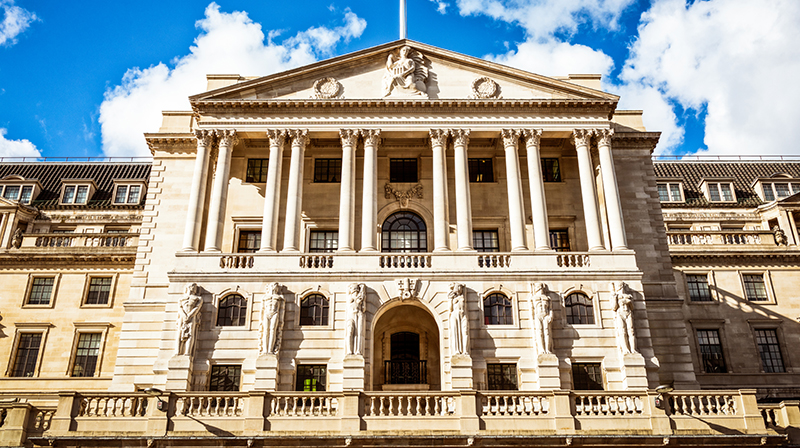The Bank of England (BoE) has raised interest rates by a “hefty” 75 basis points (bps) – as had been widely expected – in the largest single rate increase since 1989. The bank’s Monetary Policy Committee (MPC) voted by a majority of 7-2 for the 75bps rise, with one vote apiece for 50bps and 25bps rises.
The eighth successive increase takes rates to their highest level since the financial crisis of 2008, with the base rate now standing at 3%. Market consensus now expects the pace of rate hikes to slow – although increases look set to continue as inflation is expected to reach 11% by the end of 2022.
Richard Carter, head of fixed interest research at Quilter Cheviot, said: “Markets had widely anticipated the hefty rate hike – particularly given the Bank has had to make the move prior to the government’s fiscal statement after it was delayed until later this month. However, this latest move is actually significantly lower than it could have been given the furore caused by the mini-budget just a matter of weeks ago. The change of prime minister appears to have restored some calm to UK bond markets, and the BoE could take a smaller step as a result.”
“Further rate rises are no doubt on the cards in the months ahead, but the pace at which they are increased is likely to slow. Mortgage rates are already reaching increasingly high levels that are fast becoming unaffordable for many, and the prospect of tax increases at the chancellor’s upcoming Autumn statement may also put a dampener on future hikes,” he added.
Growth outlook gloomiest since Covid
The general mood among industry commentators is pessimistic for the months ahead for the UK, as many anticipate a recession. According to Vivek Paul, UK chief investment strategist at Blackrock Investment Institute, for example, the now-defunct mini budget is still taking a toll on UK fiscal credibility.
“The trade-off central banks face between inflation and growth is the most difficult in a generation, with the BoE’s material monetary tightening today coming even as it recognises the UK is already heading towards a recession,” he said.
“While the mini budget may be no more, its legacy persists in one key manner: markets have reminded us that investors care about fiscal credibility and, with the government’s plans to plug the fiscal deficit yet to be finalised, the MPC may still be worried about the inflationary implications of unsustainable fiscal policy. Even though evidence of the damage to growth from higher rates is becoming clear, today’s hike is unlikely to be the last.”
Paul added: “With UK rates volatility at historic highs, caution is still warranted on gilts. And with the downturn yet to come, UK equity index valuations look tough to support in the near term. We remain underweight all developed market equities for the coming 6 to 12 months – and that includes the UK.”
‘Difficult balancing act’
The BoE’s decision follows similar rate rises from the ECB and the Fed in the last week. Commenting on the UK’s outlook for the months ahead, Dan Boardman-Weston, CEO and chief investment officer at BRI Wealth Management, said: “The recent large rate moves by the ECB and the Fed had put pressure on the MPC to move quicker and more aggressively given other central banks had adopted faster tightening.
“The Bank has a difficult balancing act, though, as the current cost-of-living crisis combined with higher interest rates and higher taxes means the growth outlook for the UK is gloomier than it has been since the dark days of Covid, and we’re likely to see a continued slowdown in economic activity over the coming months.”
Boardman-Weston added: “The inflation continues to be largely supply driven and interest rate increases are not going to assist with these contributory factors to inflation. While we have more political stability than we have done for some months, economic instability unfortunately continues.”
The next decision on UK interest rates will be taken at the MPC meeting scheduled for 15 December.










